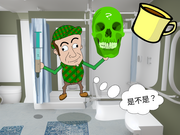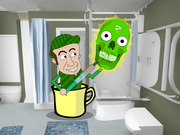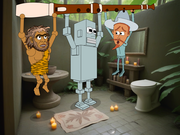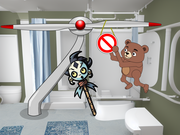in / at / to / from / by / than / out of
于
=
亅
+
二
:
Mnemonic symbol: prepositions are what glue the sentence together. Honey is as sticky as glue, so I'll represent 于 by a honey jar.
Yu the Great was assigned to repair the electrics of the space station's entrance, but instead she was snacking some honey from a honey jar. Now her capacitor got stuck in the honey and she has to use a crowbar to lever it out.
Yu the Great was assigned to repair the electrics of the space station's entrance, but instead she was snacking some honey from a honey jar. Now her capacitor got stuck in the honey and she has to use a crowbar to lever it out.
(of time or place) in; at; on / (indicating any indirect relation) to; toward; vis-à-vis; with regard to; for / (indicating a source) from; out of / (used in comparison) than / (used in the passive voice) by
(pronoun) this; these / (bound form) this; the (followed by a noun) / (bound form) this; these (followed by a classifier) (in this sense, commonly pr. [zhei4], esp. in Beijing)
Mount Huaguo in Jiangsu, featured in 西遊記|西游记[Xi1 you2 Ji4], tourist destination / (also the name of mountains in other parts of China)
flower / blossom / CL:朵[duo3],支[zhi1],束[shu4],把[ba3],盆[pen2],簇[cu4] / fancy pattern / florid / to spend (money, time) / (coll.) lecherous / lustful
variant of 花[hua1] / flower / blossom / also pr. [wei3]
fruit / result / resolute / indeed / if really
mountain / hill / anything that resembles a mountain / CL:座[zuo4] / bundled straw in which silkworms spin cocoons / gable
山
=
丨
+
凵
:
Mnemonic symbol: 山 looks like the tip of a fork. Sherlock Holmes (sh) is climbing a mountain (山) in front of the anthill (an1). He uses a dinosaur bone (〡) as walking stick, and to have better grip he attached a fork (山) to its tip. Unfortunately he accidentally sticks the fork into a receptacle (凵) on the ground of the mountain and gets shocked.
can / may / able to / to approve / to permit / to suit / (particle used for emphasis) certainly / very
可
=
丁
+
口
:
Alternative mnemonic symbol: kebab, from the pronunciation "ke". Karl Marx (k) is preparing a kebab (mnemonic symbol for 可) in the elevator's living room (e3). He also skewers mandarins (口) on the long steel nails (丁) and will only allow (可) his guests to eat the rest of the kebab if they eat their mandarins first.
to be (followed by substantives only) / correct; right; true / (respectful acknowledgement of a command) very well / (adverb for emphatic assertion)
是
=
旦
+
龰
:
Mnemonic symbol: a skull, from "to be or not to be".
Sherlock Holmes (sh) starts his day in the space station's bathroom (Ø4) with a mug of coffee (旦). Holding a skull (mnemonic symbol for 是) in his hands, he asks himself "to be, or not to be" (是). He wonders if he can make the skull come back to life using lots of coffee, and injects coffee from his mug into the skull using a syringe (龰).
Sherlock Holmes (sh) starts his day in the space station's bathroom (Ø4) with a mug of coffee (旦). Holding a skull (mnemonic symbol for 是) in his hands, he asks himself "to be, or not to be" (是). He wonders if he can make the skull come back to life using lots of coffee, and injects coffee from his mug into the skull using a syringe (龰).
是
=
日
+
下
+
人
:
Mnemonic symbol: a skull, from "to be or not to be".
Sherlock Holmes (sh) watches the Neanderthal Man (人) trying to climb to the sun (日) on a ladder (下) in the space station's bathroom (Ø4). Sherlock is afraid that he'll open the window, so he puts on a big skull (是) and scares him off.
Sherlock Holmes (sh) watches the Neanderthal Man (人) trying to climb to the sun (日) on a ladder (下) in the space station's bathroom (Ø4). Sherlock is afraid that he'll open the window, so he puts on a big skull (是) and scares him off.
big; large; great / older (than another person) / eldest (as in 大姐[da4 jie3]) / greatly; freely; fully / (dialect) father / (dialect) uncle (father's brother)
each other / one another / mutually / fret on the neck of a pipa 琵琶[pi2 pa5] (a fret on the soundboard is called a 品[pin3])
appearance / portrait / picture / government minister / (physics) phase / (literary) to appraise (esp. by scrutinizing physical features) / to read sb's fortune (by physiognomy, palmistry etc)
相
=
木
+
目
:
I take "eye" and "tree" as resembling an ent, an alive tree. Marie Curie portrays an ent in the anglepod's bathroom. Unfortunately she's really bad at painting, and her portrait resembles more a Christmas tree. The Eye of Providence enters and, just from the shape of the Christmas Tree, instantly recognizes its own portrait. The Eye of Providence asks Marie Curie how much she wants to have for the painting, but Marie Curie just wonders if the Eye of Providence is made from Radium, because it radiates so much.
interjection of surprise / Ah! / Oh!
啊
=
口
+
阿
:
Auntie was supposed to meet Albert Einstein in front of the ashram, but Albert is nowhere to be seen. There is just a huge mandarin lying around. After auntie has waited for a long time, she finally decides to peel the mandarin. As she peels of the first piece, Albert Einstein jumps out of the mandarin, shouting "阿姨! Surprise!" Auntie in turn just screams "啊" in surprise as she swiftly suffers from a heart attack.
interjection or grunt of agreement / uhm / Ah, OK / expression of recognition / Oh, it's you!







